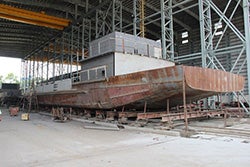
Promoting career opportunities through industry linkages for those who complete technical and vocational education is now a reality in Bangladesh. The local shipbuilding industry is thriving with strong growth potential. Currently, the demand for technically skilled workers in Shipbuilding industry is high. The industry is likely to become a major employment provider for the technically skilled workers in Bangladesh. Not surprising, that 55 of the 72 welders who had completed their training from Khulna Shipyard Technical Training Centre (KSYTTC) were absorbed by a private shipbuilding and light engineering firm, Khulna Shipyard Limited (KSY) in August 2014. The same company will hire 30 more in the coming month.


After joining STEP in 2012, KSYTTC established a job placement cell for successful graduates. This cell maintains an updated student database, and communicates with potential employers in both national and international markets. 293 students have graduated from KSYTTC till June 2013 with support from the STEP. Around 85% of students got jobs within the first year of completion of the training.

The institution receives a maximum implementation grant of US$250 per student enrolled in a course. This grant covers the tuition costs of the institution; and provides a stipend to students in courses supported under the project. Each student receives a stipend of about US$10 per month. Moreover, to enhance industry linkages, and to provide relevant training to the industry, the fully operational Institute Management Committee (IMC) has been established by KSYTTC. The institution also participates in job-fairs, which are organized by STEP.

Bangladesh has long been known as a shipbreaking country. It is now transforming itself into a shipbuilding one. Small and medium-sized ships are being produced and repaired in the shipbuilding yards to meet the demands of both national and international shipping industry. Beginning from 2008, Bangladesh has built and supplied cargo vessels, ferries, and ocean-going multi-purpose ships worth more than US$ 550 million to buyers from Bangladesh and from countries in highly competitive European markets like Finland, Denmark, and Germany.

The global recession of 2008 slowed the growth in the shipping industry. However, experts are expecting a sharp rise in global demand as more than 50% ships of the world are more than 20 years old and need to be replaced. As major shipbuilding countries like China, South Korea and Japan are more interested in building hi-tech, large and specialized ships, so there is an opportunity for Bangladesh to produce smaller vessels where the competition is less intensive. To bridge the market gap, the demand for skilled workforce and industry linkage is growing. Hence, STEP is committed to providing financial and technical support to the TVET sector of Bangladesh to enhance economic growth and empowerment and turn the dreams of the students into reality.


Join the Conversation